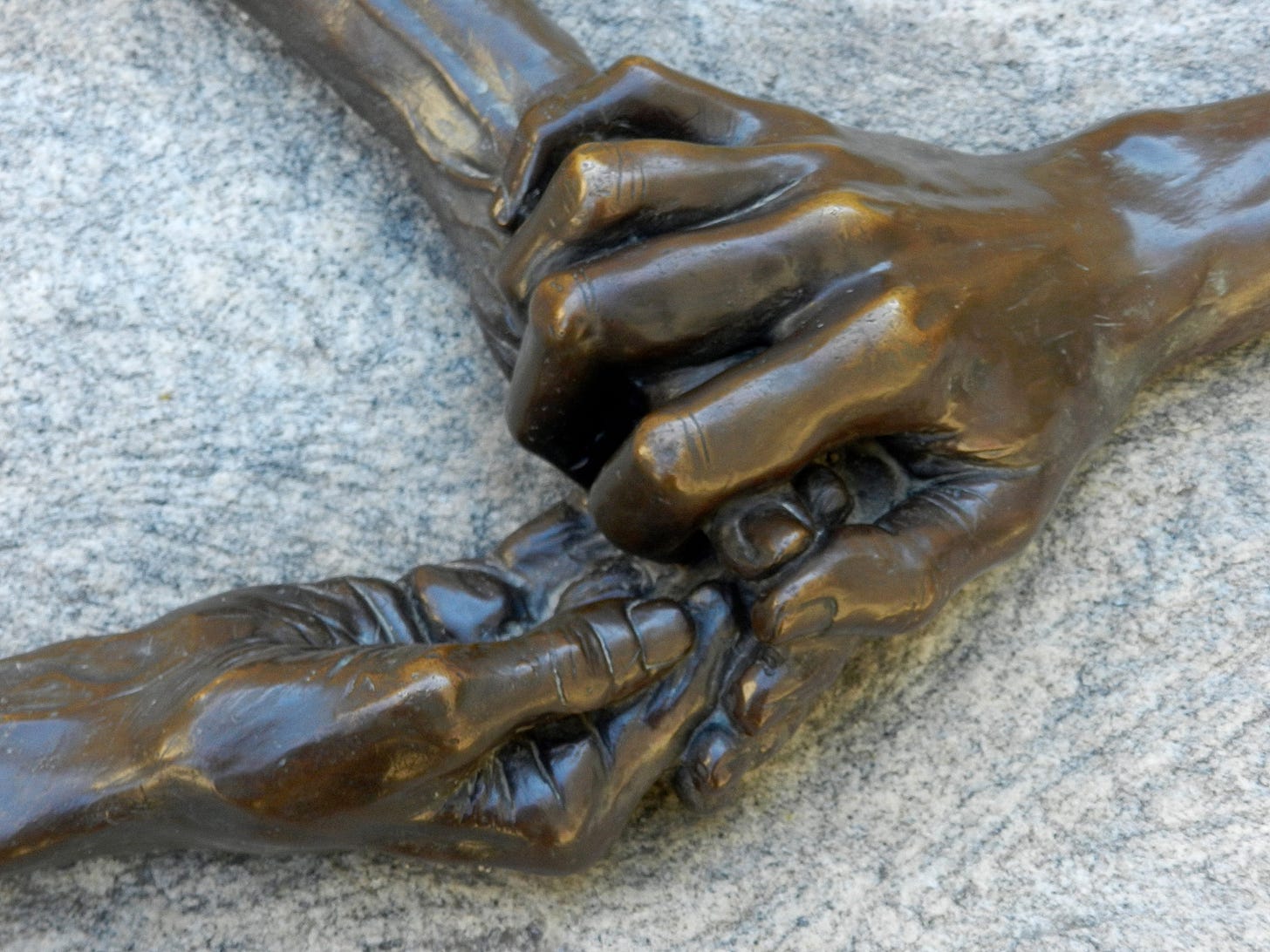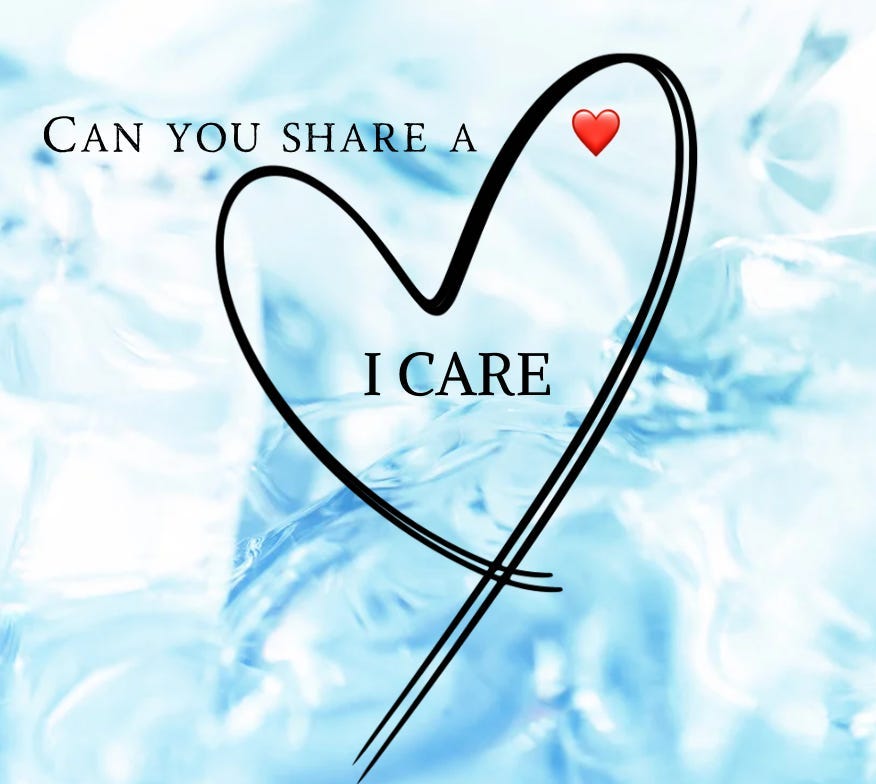Dear Readers, this letter explores themes of grief, loss, and trauma. If this is not the right time to share this space with me, please be gentle with yourself. Come back another day or check out some letters from the archive.
“When you have two centuries of people who have not properly grieved the things that they have lost, the grief shows up as ghosts that inhabit their grandchildren.”
― Martin Prechtel, The Smell of Rain on Dust: Grief and Praise
I still remember the slight pressure of her hand on my shoulder as my body shook with sobs. She stood above me quietly while we listened to the Code Blue being called overhead for my Dad. I was in the same hospital where years earlier, I’d worked in the ICU, responding to the Code Blue on the other side of the door, rushing to grab the crash cart and the life-saving medicine we hoped might work. This time, I sat in the waiting room, helpless to intervene.
In fact, I wasn’t even supposed to be there. COVID-19 restrictions meant I should have been waiting in the parking lot in my car. However, the grace of the hospital staff and the gravity of my Dad’s condition meant I didn’t have to be alone during one of the worst moments of my life.
I don’t remember her name but I remember her presence. The hospital chaplain on duty, she waited beside me in that liminal portal between life and death for hours. The physical sensation of another body next to mine, silently witnessing my suffering anchored me to this world—a simple, sacred act of being with.
Twelve days later, my Dad passed away with my sisters and I by his side. That moment in the waiting room was the beginning of a harrowing, life-altering experience of grief and loss. At the same time, I was overwhelmed with an immense gratitude I didn’t know I could feel in the depth of so much pain.
Losing my Dad to a fatal heart attack changed my life in so many ways, both good and bad. It softened me into surrender. It created space for me to be the helped instead of the helper, the daughter instead of the nurse. The one who needed instead of meeting everyone else’s needs.
In the aftermath of his death, I longed for an external signal that would let others know I was in mourning. To tread a little more tenderly around me. To be patient and kind. My uncontrollable sobs were the first sign that allowed someone to offer consolation. Months after his death, my red, puffy eyes (I cried almost every morning on the way to work) said more than my words ever could have.
While crying is often something we try to hide, during this experience I realized we should do the opposite. Crying is a signal for help, a soft opening of vulnerability that calls others near. It’s a universal symbol of joy, grief, or pain. By allowing ourselves to cry openly in front of others, we can attract the help we need. The community we deserve. The presence and compassion and connection required to heal and survive, especially during tragedy.
Heartbeats is a community for creatives, caregivers, and messy humans who believe in the power of community. By financially contributing to Heartbeats you are saying yes to collaboration, connection, and creating sacred spaces where we can heal, learn, and honor each other with care. Thank you for your presence here. 💞
The more I live with grief and learn about trauma (as someone who experiences complex PTSD) the more I’m convinced that our healing happens in community. Our grief longs to be seen and witnessed in sacred ritual. Even if that ritual is sitting on the floor with a friend in tears. Even if that ritual is as simple as the reassuring hand of a stranger on your shoulder.
Prentis Hemphill defines trauma as a relational injury. We are wounded by life when we experience loss and pain in isolation, separated from others. Connecting during our darkest moments is not a luxury, it’s how we survive.
Allowing tears to fall down our faces, letting the sobs shake our bodies, and freely expressing our pain in the presence of others creates resilience. Just as our tears create a physiological response in our bodies that promotes healing, our tears initiate spiritual healing. They signal Life to come near with resources of love.
When we give ourselves permission to feel the depth of our grief, frustration, or joy, we permit others to do the same. We widen the safety net of love. We extend the invitation for everyone to come more fully into their aliveness.
“Grief expressed out loud for someone we have lost, or a country or home we have lost, is in itself the greatest praise we could ever give them. Grief is praise, because it is the natural way love honors what it misses.”
― Martin Prechtel, The Smell of Rain on Dust: Grief and Praise
So, how can we create sacred spaces to share in each other’s grief, beyond a memorial service or funeral? I don’t have all the answers but I believe it begins with a change in the cultural narrative. With more paid time for bereavement. With learning how to stay out of “fix-it” mode and enter the sacred ritual of witnessing without trying to solve the unsolvable pain of grief.
It begins with acknowledging that we all need help. Whether that’s asking a friend for permission to come over and cry, working with a grief and trauma specialist, or creating a ceremony for grieving the loss of a job, friendship, relationship, or other life milestones. It begins with holding rituals over and over until it becomes a habit. It starts by learning how to sit in the discomfort, allowing ourselves to unravel and change, and giving others grace to do the same.
It starts with crying. It begins with us. By embracing our tears as a natural expression of being alive, we can honor life more deeply, celebrating its wonder, beauty, and mystery.
If you have resources that have helped you navigate the unimaginable terrain of grief and would like to share them, I started this note as a grief resource we can add to and share.
Add your voice to the conversation by commenting, sharing, and letting others know they’re not alone.
May your tears fall with love and grace.
All my love,
Mariah
P.S. This reflection is part of a wider collaboration with 13 other authors, caregivers, and beautiful humans sharing the importance of crying throughout September. Below is the list of articles that are part of our month-long collaboration. Up next is
, a licensed clinical psychologist with a specialty in anxiety, obsessive compulsive disorder, and maternal mental health. Her post will be published September 16th. I can’t wait to read her perspective!The Caring About Crying Anthology. We All Cry. You’re Not Alone.
Sept 1 Launch article: Caring About Crying. We All Cry. You’re Not Alone By Victoria at Carer Mentor: Empathy and Inspiration
Sept 2 Crying: 'Did you know?' Resource: Tears the science and some art. By Victoria at Carer Mentor: Empathy and Inspiration
Sept 3 'Cry, Baby. Why Our Tears Matter' A Podcast Interview. Dan Harris and Dr Bianca Harris of Ten Percent Happier with Reverend Benjamin Perry. By Victoria at Carer Mentor: Empathy and Inspiration
Sept 4 ‘In Conversation with Rev. Benjamin Perry’. Victoria interviews the Author of 'Cry Baby: Why Our Tears Matter' By Victoria at Carer Mentor: Empathy and Inspiration
Sept 5 ‘My stoic mom's parting gift. Making peace with tears’ By
Sept 6 We Invite You to 'Care About Crying'. By Victoria on behalf of the team.
Sept 6 ‘ICU Special Edition: There's Crying in Baseball?’ By Nurse Kristin at HCT: Heal Cure Treat
Sept 7 Triggered. Caring About Crying Anthology By
Sept 8 'Can't Cry. Want to Cry??' A Caregiver's Paradox of Human-ing. By Victoria at Carer Mentor: Empathy and Inspiration
Sept 9 AWC Town Bulletin - On Crying A Discussion Thread
Sept 10 The Healing Power of Tears. How giving myself the permission to cry a good cry helped me process unspeakable pain and lifted me out of deep depression. By Louisa Wah at Lily Pond
Sept 11 My Tears are not a Grief Gauge. Crying through Ages and Stages By Anna De La Cruz at Gen Xandwich.
Sept 13 Sweet Relief. After He Said Cancer | A Memoir By
Kristina Adams Waldorf, MD at After He Said Cancer











This is a beautiful piece. Thank you for sharing your heart.
Thank you, Mariah xoxo. I appreciate you reliving this heartbreaking time and sharing your experience of crying with us.
You raise an important point that communities can respond to puffy eyes and connect vulnerably when they see them.
I appreciate this: "I believe it begins with a change in the cultural narrative. With more paid time for bereavement. With learning how to stay out of “fix-it” mode and enter the sacred ritual of witnessing without trying to solve the unsolvable pain of grief." SO true
'By embracing our tears as a natural expression of being alive, we can honor life more deeply, celebrating its wonder, beauty, and mystery.' Love this expression - Our tears are a form of honouring life in its fullness, together.